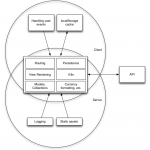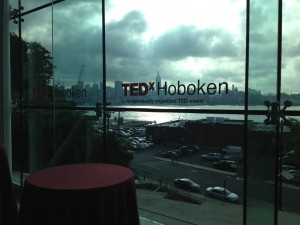One of the easiest ways for your organization to be generous and create opportunities for others is to share your learning.
Keeping all your learning inside your own organization is a stingy behavior. It’s the organization’s form of knowledge hiding or knowledge hoarding.
Sure, keeping your knowledge inside your own business’s walls keeps other organizations from catching up to yours in a particular area, but it also prevents your organization from amplifying your own learning by seeing how others might use the same ideas a little differently.
Boost Companies have a practice for sharing their learning that is relatively easy to do, and has a really high payoff for the work that it might take.
That practice is Working Out Loud in Public.
Working Out Loud in Public
Boost Companies work out loud by talking about what they’re doing while they’re doing it. Talking and writing about what you are doing “externalizes” the ideas and insights. It gets them out of your head and onto a place where you and others can more easily see what you’re doing and find ways to improve.
Some companies already work out loud inside their company walls, sharing their learning but keeping it all private. Boost Companies deliberately choose social, network tools like blogs to work out loud in public- where anyone can see.
 With these tools, boost companies create a window into their company’s learning process. That means that people outside the company, like us, can look through this public window and learn along with them.
With these tools, boost companies create a window into their company’s learning process. That means that people outside the company, like us, can look through this public window and learn along with them.
(That image is supposed to be a boost company, seen through a window.)
You can see this practice of Working Out Loud In Public in action on any one of hundreds of software engineering blogs (which I read for fun, because I don’t know why.)
On engineering blogs, developers write about what they’re doing to build new software, solve problems, or increase their system’s reliability. Since they publish this writing publically, they invite other software developers to learn along with them.
An example that I used in my TEDx talk, which you can check out yourself, is over at the lodging reservations site, AirBnB.
Working Out Loud In Public at AirBnB
(Summarizing this story for the general reader): Starting in about October of 2012, the software designers at AirBnB, have been working out loud on a particular challenge– speeding up their mobile app. They identified the problem, tried several different combinations of (what non-engineers would describe as) software revisions, patches, temporary fixes, and new tools. With each experiment they’ve explained out loud, in public, on their blog, exactly what they tried, why, what worked and what didn’t.
They even shared and open-sourced the tool they built, to save everyone else that step.
 How many people do you imagine read those AirBnB blog posts?
How many people do you imagine read those AirBnB blog posts?
I guessed that there were maybe a few hundred readers. I was stunned to learn that they’d had over 80,000 page views.
What does that net out to, in terms of unique visitors? I tweeted a few of AirBnB’s engineers to ask them, but they weren’t able to give me a firm number. Considering that some readers come back many times, I suspect those 80,000 page views net out to 20,000 to 60,000 people.
At either end of that range, that’s an amazing number of people who can learn from AirBnB’s experience, improve their own developer skills, and apply AirBnB’s lessons to make their own companies’ sites faster too. All from a simple act of sharing your process using a public tool.
A caveat
Of course, Boost Companies don’t work out loud in public on everything that they do. They don’t share the recipe to the “secret sauce” or give away competitive secrets.
In the case of engineering blogs, they focus on technical or process learning (versus content, product or market learning) that is generalizable because it improves a core process that does’t compromise the business’s distinctive value. Rather, by Working Out Loud In Public, boost companies share whatever else they can that might help another business get better.

Working out loud in public means that we get the business-building benefit of reflecting on our own learning and sharing it within our organization.
Working out loud in public means that we share that learning with whoever can use it, in the hopes that they apply it in their own business to build capacity and create new opportunity.
Boost Companies believe that — if we make it easy to learn from each other’s experience — as a group we’ll make fewer mistakes and — we’ll all grow smarter, faster.
Note: This post covers one of the three practices of generative generosity, as I describe in my TEDx Hoboken Talk: The Boost Revolution.
See also: How Social Media Reveals Invisible Work
How Social Media Can Help Us Generate Productive Momentum
Check out John Stepper’s blog, where he’s been unpacking the idea of Working Out Loud.
 I am an organizational consultant, change advocate, and organizational identity/reputation scholar with a PhD in leadership & organizations. I research, write about, and consult with organizations on the relationships between organizational identity, actions, and purpose. I teach Technology Management, part-time, at Stevens Institute of Technology.
My current research focuses on how social technologies in the workplace can drive organizational change, generate meaning, and catalyze purpose. See the
I am an organizational consultant, change advocate, and organizational identity/reputation scholar with a PhD in leadership & organizations. I research, write about, and consult with organizations on the relationships between organizational identity, actions, and purpose. I teach Technology Management, part-time, at Stevens Institute of Technology.
My current research focuses on how social technologies in the workplace can drive organizational change, generate meaning, and catalyze purpose. See the 
Comments on this entry are closed.
{ 4 trackbacks }